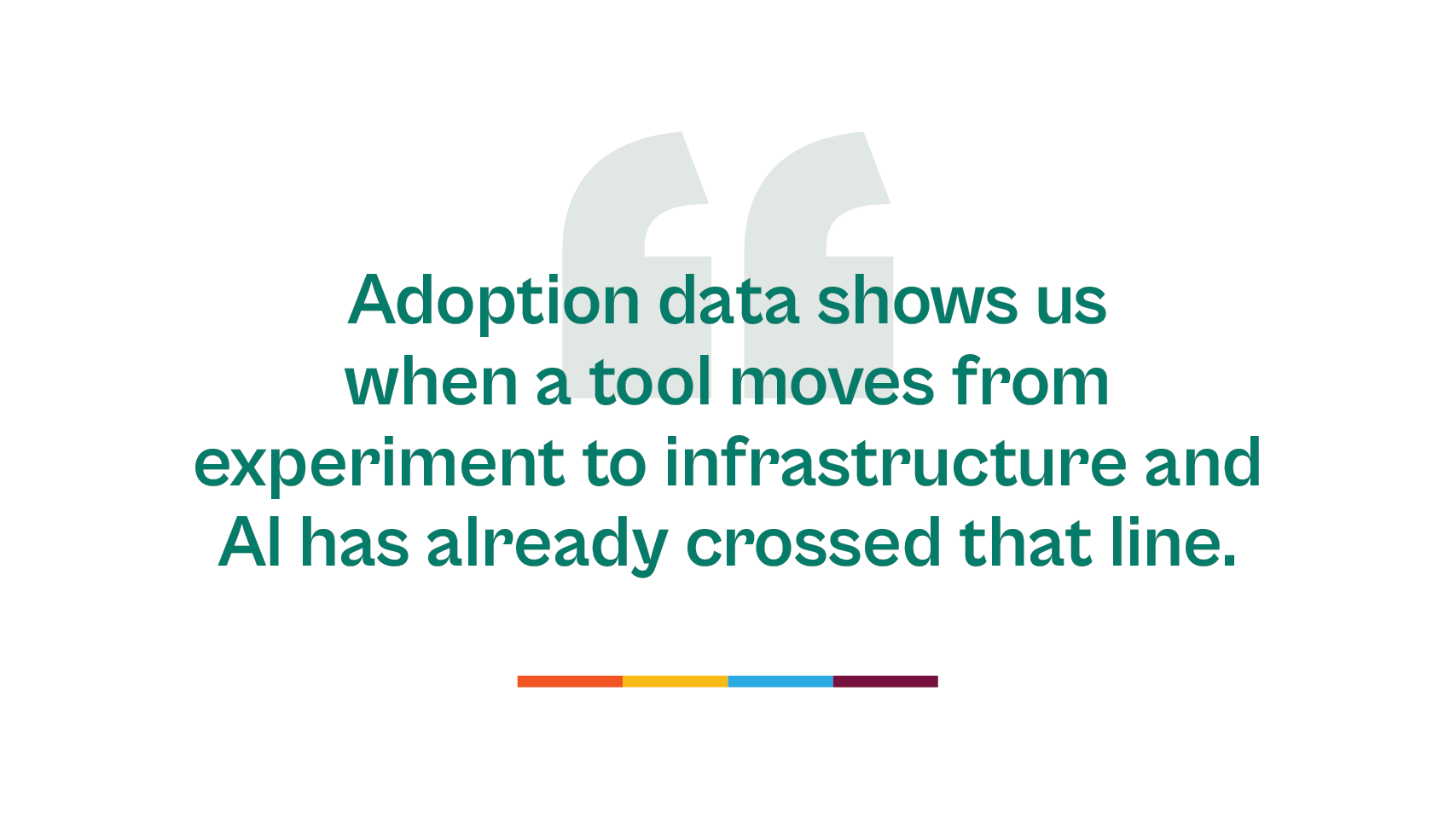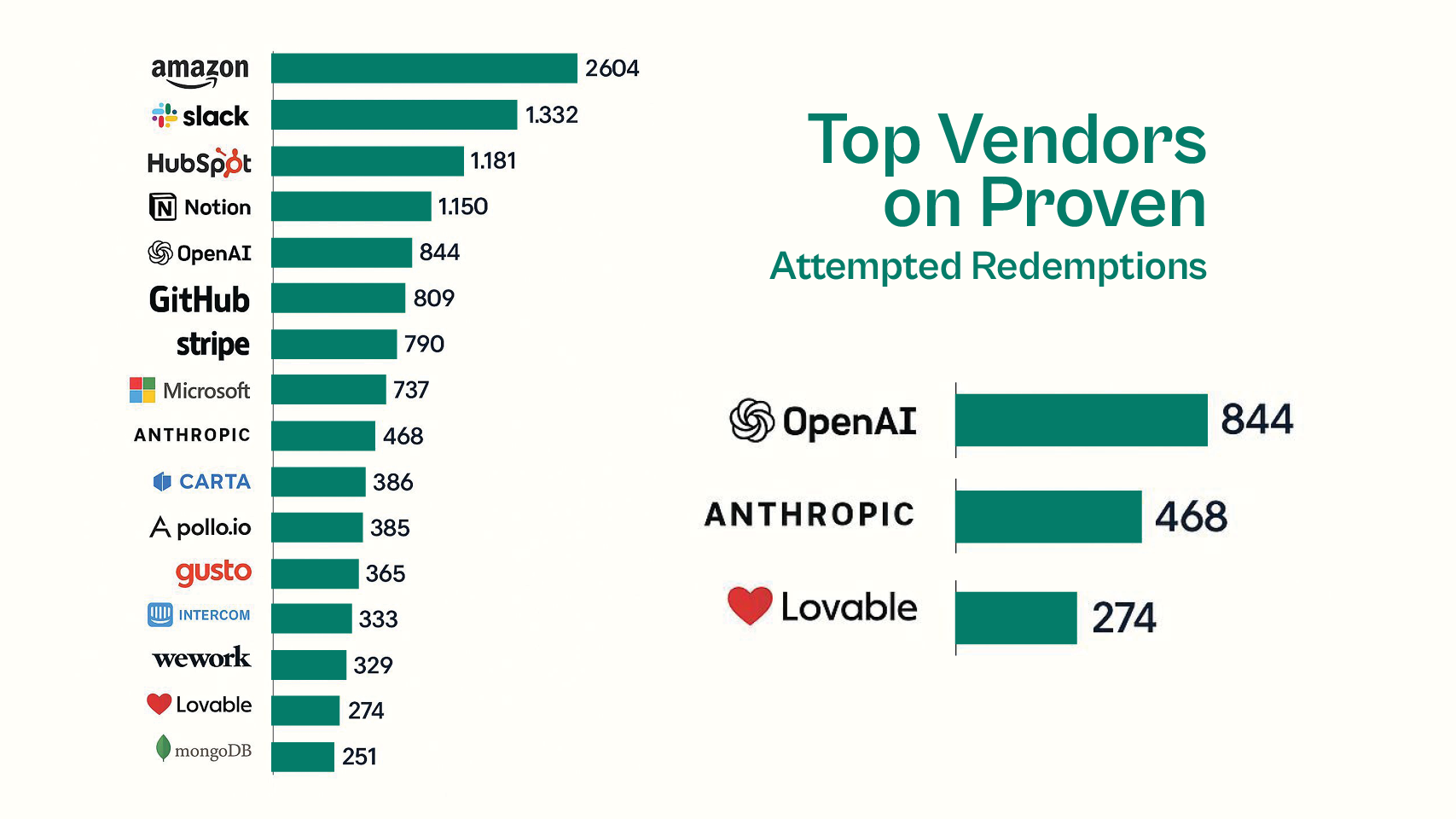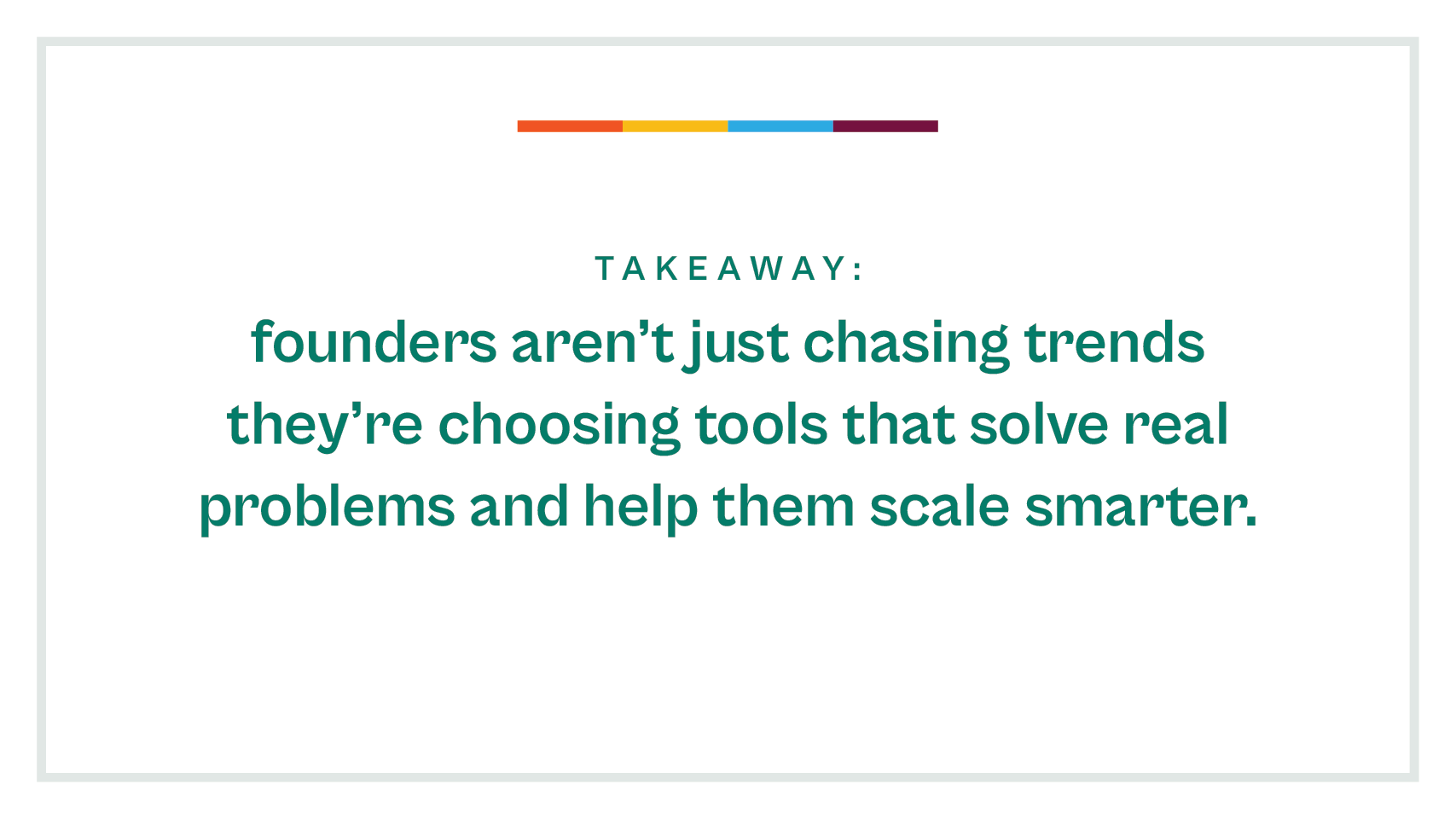
The AI Surge: Why Certain Tools Are Dominating Startup Tech Stacks (2025 Edition)

Are AI companies taking over the world? If you’ve looked at the latest perks adoption data from Proven, the answer feels like a resounding yes. Artificial intelligence isn’t just hype, it’s reshaping how early stage startups and portfolio companies operate.
At Proven, we’ve tracked the perks used by more than 62,000 venture-backed companies, and the results are clear: new AI tools like Lovable, Anthropic, and OpenAI are climbing the charts alongside long-standing names like Amazon, Slack, Hubspot, GitHub, Stripe, and Notion.
AI tools aren’t just “trending”, they’re now core parts of the startup tech stack.
Why? Because they:
- Save time and money for early stage startups and portfolio companies.
- Automate complex tasks like deal sourcing, data entry, and due diligence.
- Provide real time insights and predictive analytics that help venture capitalists identify potential investment opportunities and optimize investment terms.
- Deliver competitive advantages in an increasingly crowded market.
How do we know this? Because we track tool adoption and offer exclusive discounts on in demand tools, helping startups and VC firms save millions while staying ahead of market trends. You can get access to the best vendors and perks through our marketplace here.
AI Tools in the Modern Tech Stack
Today’s startup tech stack looks very different from even five years ago. What once revolved around staples like Google Workspace for productivity, GitHub for code collaboration, and Stripe for payments now increasingly includes artificial intelligence at its core.
This shift is being driven by generative AI platforms. Founders are turning to these tools for everything from content creation and video editing to deal flow automation and startup evaluation. Instead of patching AI in as an add-on, startups are weaving it directly into daily operations.
At the heart of this movement are large language models (LLMs) such as OpenAI’s GPT and Anthropic’s Claude. These advanced language models can transform messy, unstructured data into clear, human like text, automate repetitive data entry, and surface real time insights that would have taken hours (or entire teams) to uncover manually.
The result? A redefinition of efficiency on both sides of the table. Founders gain the most significant advantages of running leaner, more cost effective operations while focusing resources on product and growth.
Meanwhile, investors benefit from deeper insights, predictive analytics, and a faster read on technological viability and potential risks all of which improve their ability to identify and act on the most promising investment opportunities.

Why AI Tools Are Rising
The momentum behind AI isn’t just hype, it’s rooted in practical benefits. Startups and investors are adopting these tools because they solve real problems.
It begins with time. For founders juggling fundraising, building the final product, and managing lean teams, every hour counts.
AI tools step in to save time and money by automating repetitive tasks like data entry, producing business plans, and even streamlining the term sheet generation process. What used to take days can now be done in minutes, freeing founders to focus on growth.
That efficiency carries over into how startups are judged. Many VC firms spend countless hours in deal sourcing processes and due diligence. Now, AI platforms help by assessing a startup’s financial health, flagging potential risks, and highlighting high potential investments that meet specific criteria. This reduces the time venture capitalists spend combing through raw data and allows them to zero in on the most promising investment opportunities.
The real kicker, though, is insight. AI tools transform vast amounts of complex data into detailed insights and predictive analytics. Instead of relying on gut instinct or scattered spreadsheets, both founders and investors can make data driven decisions with a clarity that simply wasn’t possible before.
AI Among the Titans
It’s tempting to think of AI as an entirely separate category of tools but in reality, it’s becoming part of the fabric of startup operations. The rise of artificial intelligence doesn’t mean established platforms like Amazon, Slack, or Stripe are losing relevance. Far from it. These remain the backbone of the modern tech stack.
What’s changed is the way AI tools complement them. Just as Google Cloud and dedicated servers became non-negotiable for scaling companies, AI tools are now filling the same role for intelligence and automation.
Generative AI sits alongside Hubspot, Notion, and Microsoft, enhancing workflows with real time insights, language model capabilities, and market research at scale.
This blending of the old and new reflects the competitive landscape startups operate in today. To stand out, founders need both the latest tech innovations and the tried-and-true systems that keep their companies running. That’s why AI is best seen not as a replacement, but as a multiplier that makes established tools more powerful giving startups a competitive edge in emerging sectors.
New tools outshining classic business staples in 2025
While tools like Amazon and Microsoft have been staples in startup stacks for years, the real story of the past six months is the meteoric rise of tools like OpenAI, Anthropic, and Lovable. In the Proven Database, we’ve noticed these platforms climb the rankings at a speed we’ve never seen before.
Their rapid adoption signals a shift: the dominance of long-established players is no longer guaranteed, and new entrants are proving they can compete for a central spot in the modern stack.
For founders and investors alike, it’s a reminder that staying competitive means watching not just the incumbents, but also the emerging technologies rewriting the rules in real time.

The Tools Defining Today’s Startup Stacks
Startups don’t choose tools at random. Each one solves a very specific pain point, from infrastructure to fundraising. Here’s the latest ordered list of the platforms founders and portfolio companies rely on most and why:
- Amazon (AWS) – The backbone of cloud computing. Startups lean on AWS for scalable infrastructure, dedicated servers, and global reliability without the upfront cost of building data centers.
- Slack – The communication hub. It centralizes messages, integrates with other SaaS tools, and helps lean teams collaborate in real time, no matter where they are.
- Hubspot – Growth through automation. Its CRM and marketing automation tools let startups nurture leads and scale sales pipelines without hiring massive teams.
- Notion – The flexible workspace. Founders use it to organize business plans, project roadmaps, and even fundraising pitch decks in one accessible place.
- OpenAI – AI on demand. From content creation and customer support to data analysis and code generation, its large language models reduce manual work and speed up operations.
- GitHub – Collaboration for builders. It’s the go-to platform for code management, version control, and open-source projects, making it indispensable for technical teams.
- Stripe – Money in, money out. Startups rely on Stripe for payments, subscriptions, and global financial infrastructure that scales as they do.
- Microsoft – The productivity suite. Tools like Office 365 and Azure remain critical for enterprise-level security, collaboration, and cloud solutions.
- Anthropic – AI for safer decision-making. Claude, its advanced language model, helps startups parse unstructured data, generate insights, and automate research tasks with a focus on reliability.
- Carta – Ownership clarity. Essential for managing equity and cap tables, especially during fundraising and the term sheet generation process.
- Apollo.io – Smarter sales prospecting. Founders use it to supercharge outbound, automate deal sourcing, and build targeted pipelines.
- Gusto – People operations made simple. Payroll, benefits, and HR compliance in one place, helping startups save money and reduce admin overhead.
- Intercom – Customer-first growth. Chatbots and automated messaging keep customers engaged and supported without scaling headcount too quickly.
- WeWork – Space without strings. Startups opt for its flexible, cost effective offices to stay lean while accommodating hybrid teams.
- Lovable – Faster product development. Its AI-driven workflows help founders go from idea to final product faster, cutting down iteration cycles.
- MongoDB – The database for scale. Startups choose it for flexibility, speed, and the ability to handle modern apps powered by emerging technologies.
Together, these tools show how startups are blending long-standing staples with emerging AI platforms to build efficient, resilient stacks.

What Does That Data Tells Us?
Every week, founders and investors are bombarded with news about the “next big AI tool.” But hype isn’t the same as adoption. That’s where Proven's data analysis stands apart.
We track the tools used by more than 62,000 venture-backed startups, we don’t just see which platforms are being talked about but we also see which ones are actually being used in day-to-day operations. This adoption data offers deeper insights into how startups are building their stacks and where the venture capital industry is placing its bets.
Here’s what the numbers reveal:
- AI is no longer an experiment. Tools like OpenAI, Anthropic, and Lovable are appearing in the same stacks as staples like Slack, Stripe, and Microsoft. That means founders see them as critical infrastructure, not just shiny add-ons.
- VCs are turning to AI to streamline processes. In many cases, portfolio companies are using AI for deal sourcing, due diligence, and even the term sheet generation process. This is more than chasing greater efficiency. It’s about allowing venture capitalists to make data driven decisions in real time.
- Adoption signals market trends. When entire categories of startups start leaning into platforms like Carta for portfolio management or Apollo.io for deal flow automation, it shows where the venture capital firms are putting weight. These signals help both investors and founders spot emerging sectors and high potential deals before they go mainstream.
- The cost-saving impact is measurable. By leveraging Proven’s marketplace, portfolio companies save millions each year in software spend while also getting exclusive discounts on the tools that matter most.
Instead of guessing which AI technology or SaaS platform will stick, use Proven’s insights to cut through noise, benchmark against the competitive landscape, and make informed decisions about the in demand tools that can give your company a competitive edge.
What This Means for VCs and Founders
The surge of AI adoption isn’t just a trend to watch from the sidelines. It’s an open invitation and growing opportunity that's reshaping how both startups and investors operate. The same tools that help founders move faster are also giving venture capitalists clearer, faster ways to evaluate companies.
For founders, the appeal is straightforward: AI tools let small teams punch above their weight. Automating data entry, producing stronger business plans and pitch decks, and speeding up the path to a final product means they can scale without burning through resources.
Platforms like Gusto, Hubspot, and Notion cover the essentials, while AI-first tools like OpenAI and Lovable deliver the significant advantages of cost effective operations and faster iteration cycles.
With access to exclusive discounts through Proven’s platform solutions, startups don’t just move faster they also save money along the way.
For venture capitalists, the benefits run just as deep. Instead of spending countless hours manually reviewing deals, many VC firms are now using AI to automate deal sourcing, apply predictive analytics to spot high potential investments, and even streamline the term sheet generation process.
Tools like Anthropic and Apollo.io provide real time insights into a startup’s financial health, while Carta and MongoDB data help in assessing technological viability and potential risks. The result? Less time wasted on noise, and more time focused on the most promising investment opportunities.
The bigger win is alignment. When startups and VCs use the same in demand tools, both sides of the table see the same signals. Founders can present their companies with data driven insights that resonate with investors, while vc firms gain detailed insights and deeper clarity that makes deal negotiation smoother and more transparent.
The Bigger Picture
When people talk about the venture capital industry, they often focus on valuations, term sheets, or the next unicorn. But underneath it all, what really powers growth is the tech stack founders choose and the tools venture capitalists trust to evaluate them.
The adoption data tells us something important: artificial intelligence has become the connective tissue of modern startups. From automating deal sourcing to transforming unstructured data into data driven insights, AI is rewriting how work gets done.
For founders, that means the ability to run leaner teams, scale faster, and present stronger cases during fundraising. For investors, it means deeper insights, better due diligence, and the ability to spot emerging sectors and high potential deals earlier than ever before.
In other words: AI isn’t the future of startups. It’s the present and those who embrace it now will gain the competitive edge to thrive in tomorrow’s competitive landscape.
.png)
Frequently Asked Questions
1. Why are AI tools so important for startups?
They help startups save time and save money by automating data entry, market research, and business plans, giving founders more focus on the final product.
2. How are venture capital firms using AI?
VC firms use AI for deal sourcing processes, startup evaluation, and to optimize investment terms. This allows venture capitalists to evaluate complex data, flag potential risks, and focus on high potential investments.
3. Which AI companies are the most promising right now?
Data highlights OpenAI, Anthropic, and Lovable as breakout players. These firms leverage large language models and generative AI to process unstructured data, deliver human like text, and provide real time insights.
4. Do AI tools replace traditional SaaS like Slack or Stripe?
No — they complement them. Established platforms like Amazon, Slack, Hubspot, Stripe, and Microsoft remain essential, while AI enhances workflows with automation and data driven decisions.
5. How does GetProven help founders and VCs?
We track tool adoption across 62,000+ startups, partner with venture capital firms, and offer exclusive discounts through our premium plan and pro plan. Proven gives both founders and VCs access to the in demand tools driving growth.
Conclusion
Startups and investors are no longer asking if AI will change how business is done, they’re deciding how fast to adapt. The companies that thrive in the next wave of growth will be those that treat their stack not as a patchwork of apps, but as a system designed to deliver speed, clarity, and resilience.
For founders, that means building leaner operations and keeping focus on growth rather than busywork. For venture capitalists, it means seeing past the noise and relying on data driven insights to evaluate opportunities with confidence.
At Proven, we bring both sides together. By surfacing the tools that startups actually adopt and offering exclusive discounts to make them accessible, we help founders scale smarter and give investors visibility into the trends shaping tomorrow’s market.
If your goal is to save money, move faster, and make more informed decisions, the next step is simple: Get Proven’s marketplace and see how the right stack can give you the edge for rapid growth. Get started.






.png)






